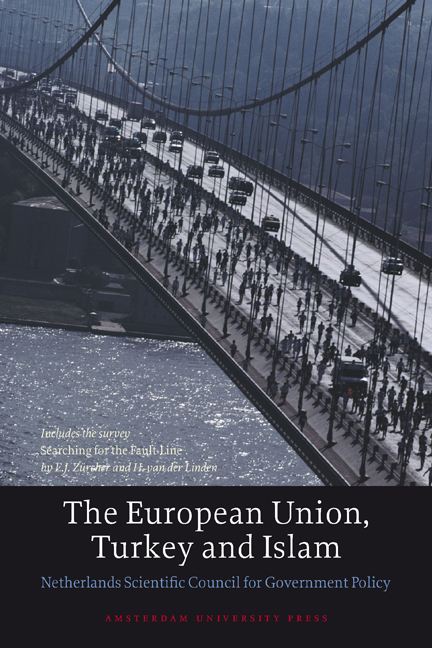Book contents
- Frontmatter
- Contents
- Summary
- Preface
- 1 Introduction
- 2 The European Union and Religion
- 3 Turkish Islam and the European Union
- 4 Conclusions
- Epilogue
- Literature
- Searching for the Fault-Line
- 5 Introduction: Turkey – Fault-Line, Frontline or Test Case?
- 6 Turkey’S Current Islamic Landscape
- 7 Turkish Islam and the Eu: a Clash of Civilisations?
- 8 Conclusion: Turkish Islam and European Civilisation
- Literature
- Websites
4 - Conclusions
Published online by Cambridge University Press: 14 January 2021
- Frontmatter
- Contents
- Summary
- Preface
- 1 Introduction
- 2 The European Union and Religion
- 3 Turkish Islam and the European Union
- 4 Conclusions
- Epilogue
- Literature
- Searching for the Fault-Line
- 5 Introduction: Turkey – Fault-Line, Frontline or Test Case?
- 6 Turkey’S Current Islamic Landscape
- 7 Turkish Islam and the Eu: a Clash of Civilisations?
- 8 Conclusion: Turkish Islam and European Civilisation
- Literature
- Websites
Summary
The EU has committed itself to assessing Turkey's membership using the same procedures it applies, and has applied, to other candidate member states. Although the religion-factor plays only a limited role in this assessment, it is precisely this factor that has generated so much disquiet. This is why, through this report and the supplementary survey, the WRR has attempted to contribute to a greater insight into the characteristics of Turkish Islam and the historical background of its relationship with the Turkish state.
The central question posed in this report is whether the fact that the majority of its population is Muslim will be an obstacle to Turkey's accession to the EU. The answer is negative. Neither the historical developments described, nor the characteristics of present-day Turkey and Turkish Islam, could justify the argument that Turkish Islam forms an obstacle to Turkey's accession to the EU. The WRR has reached this conclusion by also taking into account the widely divergent ways in which the present member states of the Union realize the relationship between state and religion, both formally and actually.
That fact that Turkey is a country with a predominantly Muslim population, certainly presents the EU with a unique situation. After all, the Christian faith is the dominant religion in the present member states as well as in the other candidate countries. So religion, i.e. Islam, has understandably become a talking point. In the supplementary study, Zürcher and Van der Linden highlight the paradox that it is precisely the EU member states, with their discourse on the separation of church and state, which include the substance of the religion in their assessment of Turkish membership. An additional factor explaining concern over Turkey is the general perception of Islam, including the rise of political Islam in Muslim states and also, naturally, recent manifestations of religious-inspired terrorism. This has contributed to the idea that the Islamic world and the West are incompatible, and that the Islamic worldview has no room for the attributes of Western democratic constitutional states; it is said to favour establishing the state on theocratic, as opposed to democratic, principles. This would mean dissolving the separation of the state and religion, replacing secular law with its Islamic counterpart, and recognising Islamic rights only, rather than a more universal concept of human rights.
- Type
- Chapter
- Information
- The European Union, Turkey and Islam , pp. 67 - 72Publisher: Amsterdam University PressPrint publication year: 2004



